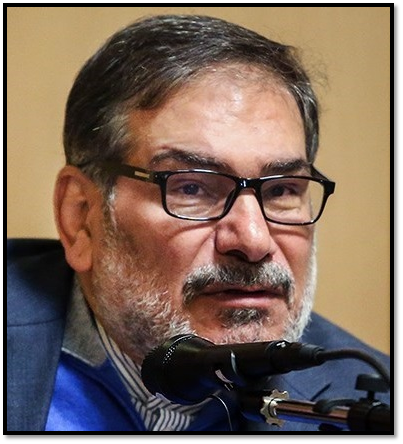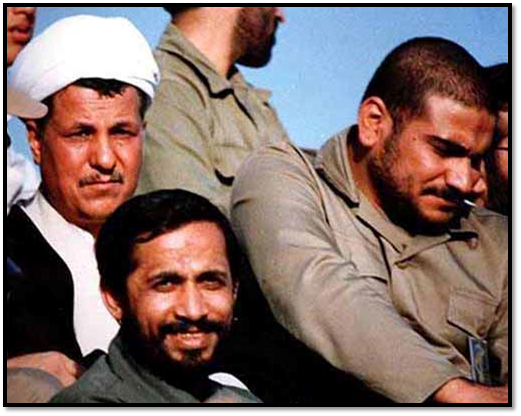After a decade surviving Iran’s fractious politics, Ali Shamkhani was removed as secretary of the Supreme National Security Council (SNSC), the highest body in charge of foreign policy and national security, on May 22. The former rear admiral, a young hero during the eight-year Iran-Iraq war who rose to become minister of defense in the 1990s, had served three presidents from rival factions as head of the SNSC. He was pushed aside in favor of Rear Admiral Ali Akbar Ahmadian, a senior Revolutionary Guards officer.

The reshuffling, which followed the execution in January of a former Shamkhani aide charged with treason, could significantly impact deliberations at the SNSC, which has only 12 permanent members. Shamkhani “is considered a balancing factor in the decision-making process in Tehran,” Danny Citrinowicz, a fellow at the Institute for National Security Studies in Tel Aviv, told The Iran Primer. Shamkhani was widely regarded to be pragmatic on contested issues, such as negotiations with the United States over Iran’s nuclear program. He was a “moderate voice” who called for “discussions and dialogue,” Alicia Kearns, British House of Commons Foreign Affairs Committee chair, told the BBC in January 2023.
Shamkhani has long been the most senior ethnic Arab in Iran’s government, largely dominated by Persians and other groups. He earned the trust of officials ranging from Supreme Leader Ayatollah Ali Khamenei, a hardliner, to President Mohammad Khatami (1997-2005), a reformist, due to his years of distinguished service in both the IRGC and the conventional military. Shamkhani’s nearly 10-year term as SNSC secretary, from 2013 to 2023, was second only to Hassan Rouhani, who served in the position from 1989 to 2005. Shamkhani has been a survivor in a regime that has increasingly purged reformists, centrists and even some conservatives.
But Shamkhani has political enemies. For years, critics have charged him and members of his family, including his sons and son-in-law, of corruption and amassed wealth through shipping and construction companies. In November 2022, Shamkhani reportedly faced criticism from hardliners for failing to quash the nationwide protests that erupted in September 2022. In January 2023, Iran executed Alireza Akbari, who served as Shamkhani’s deputy from 2000 to 2004. Akbari was convicted of spying for Britain and “corruption on earth.” The execution triggered media speculation about Shamkhani's fate. IRGC-linked media reported that he might step down, but a news agency linked to the SNSC denied the reports.
Shamkhani’s last major accomplishment was helping to broker Iran’s rapprochement with regional rival Saudi Arabia. In March 2023, he led a delegation to Beijing for talks with the Sunni kingdom. The two countries agreed to restore diplomatic ties seven years after severing relations.
Shamkhani appeared to foreshadow the end of his term with a cryptic tweet on May 21. He quoted a 16th-century poem that Iranian media took as a sign of his imminent removal. On May 22, President Raisi appointed Ali Akbar Ahmadian, an IRGC commander, to replace Shamkhani. Supreme Leader Khamenei then selected Ahmadian as his representative on the SNSC, which indicated his approval. “I would like to thank and appreciate Mr. Ali Shamkhani's responsible, persistent presence and his efforts as the leader’s representative during these years,” Khamenei wrote in a decree.
Khamenei named Shamkhani his political advisor. “In light of the closeness between the two and the degree of Khamenei's trust in Shamkhani, he will likely continue to play a significant role in the decision-making process in Tehran,” according to Citrinowicz, who headed the Iran branch of Israel Defense Intelligence’s Research and Analysis Division. “Shamkhani has a great deal of knowledge and experience, with an emphasis on the nuclear issue.”
Khamenei also appointed Shamkhani as member of the Expediency Council, a body that resolves constitutional disputes between the Parliament and the Guardian Council. The body, which includes some three dozen members, has often included officials who have fallen out of favor. So the role could be largely ceremonial. The following is a profile of Shamkhani and quotes on key issues.
Profile
Born in 1955, Shamkhani is an Arab from Ahvaz, the capital of southwestern Khuzestan province. He visited Los Angeles in the 1970s after finishing high school. His brothers chose to stay and study, but he returned to Iran. “I didn’t approve of the culture,” he told the Los Angeles Times years later. While studying engineering at Ahvaz University, he joined an underground group opposed to the monarchy.

After the revolution, he joined the Islamic Revolutionary Guard Corps (IRGC) and was named the first commander in his native Khuzestan province, near the Iraqi border. During the 1980-1988 war with Iraq, he became the deputy commander of the IRGC and commanded its ground forces at the same time.
Shamkhani served as IRGC Minister from 1988 to 1989, but the post was discontinued in 1989 amid restructuring in the Ministry of Defense. In 1989, Supreme Leader Ayatollah Ali Khamenei promoted Shamkhani to the rank of admiral and appointed him as commander of the Artesh Navy, the conventional navy. He simultaneously commanded the IRGC Navy from 1990 to 1997.
Shamkhani then served as defense minister under reformist President Mohammad Khatami between 1997 and 2005. Shamkhani ran against Khatami in the 2001 presidential election and lost by a wide margin. Yet he served as defense minister until Khatami’s second term ended in 2005. In the post, he played a leading role in improving relations between Iran and Persian Gulf sheikhdoms. In 2004, Shamkhani received Saudi Arabia’s highest medal, the Order of Abdulaziz al Saud, from King Fahd for his efforts.
From 2005 to 2013, Shamkhani directed Center for Strategic Studies, a military think tank. Centrist President Hassan Rouhani appointed him to be secretary of the SNSC. Shamkhani concurrently served as Supreme Leader Khamenei’s representative on the council. In 2020, the United States sanctioned Shamkhani along with seven other senior officials for involvement in ballistic missile strikes on Iraqi bases housing U.S. forces and for advancing Iran’s “destabilizing objectives.”
Shamkhani retained his position after President Raisi – a hardliner – took office in 2021. In March 2023, he led a delegation to Beijing for talks with Saudi Arabian officials on restoring diplomatic ties seven years after severing relations. The regional rivals committed to reopening embassies in Tehran and Riyadh by May 2023. The deal, brokered by China, also included the implementation of a security cooperation agreement signed in 2001 and a 1998 pact to enhance cooperation on trade, investment, technology, and culture.
In May 2023, Raisi replaced Shamkhani with Ali Akbar Ahmadian, an IRGC commander. The supreme leader then appointed Shamkhani as his political advisor and as a member of the Expediency Council, which is charged with adjudicating disputes between Parliament and the Guardian Council.
On the United States:
- “The continued dangerous and malicious presence of U.S. troops and their overt and covert interference in the internal affairs of countries in the region will further increase tensions in the region.” (Aug. 11, 2021)
- “The U.S.’ policy is based upon creation of chaos and insecurity, no matter where it is pursued, in Afghanistan or in Iraq.” ( 19, 2020)
- “Concerning the Middle East issues, we neither have any intention to negotiate with the U.S. nor do we have any inclination or see any need to do so.” (April 22, 2017)
On Iran’s missile program:
- “We decide about range, precision, speed and destruction power of our missiles based on our interests and threats and this process is not negotiable.” (March 3, 2019)
- “Iran has no scientific limitation to extend the range of its military missiles. Iran simply does not have the will to extend the range of missiles based on its defense doctrine; however, it constantly works to increase (their) precision.” ( 29, 2019)
On the 2015 nuclear deal:
- “The only way out of the stalemate created by the United States is to guarantee the Iranian people's rights. To revive the JCPOA (Joint Comprehensive Plan of Action), the United States must abandon its excessive demands." (Aug. 22, 2021)
On nuclear weapons:
- “We won't breach our undertakings with the Nonproliferation Treaty or the Comprehensive Test Ban Treaty…. We won't make use of this natural right to build a nuclear weapon.” (November 1998)
On Iran’s national security goals:
- “Our defensive strategy is one of deterrence. We have never started a war against anyone. And we wouldn't do so in the future. But it is also our natural right to prevent anyone from encroaching on our security. We have sustained great losses from our war with Iraq, and we could not neglect this experience.” (November 1998)
On Israel:
- “The volume of fire, the range of missiles and the tactical capability of Hamas and the Islamic Jihad that succeeded to pass through various radar systems and the Iron Dome have invalidated the idea of the invincibility of the Zionist regime…. The collapse of this fake regime can be seen in the not-too-distant future.” ( 8, 2021)
Photo Credits: Tasnim News Agency, CC BY 4.0, via Wikimedia Commons;
